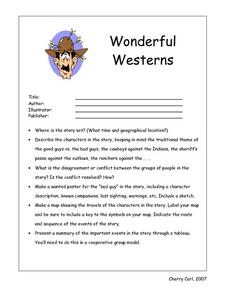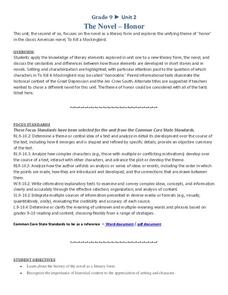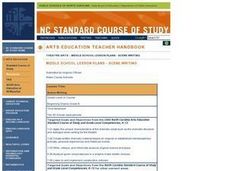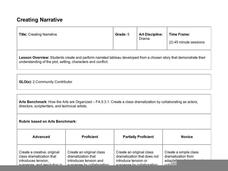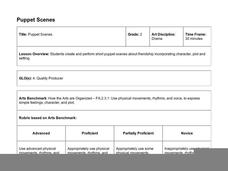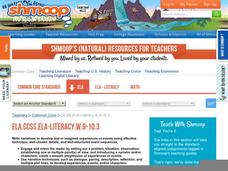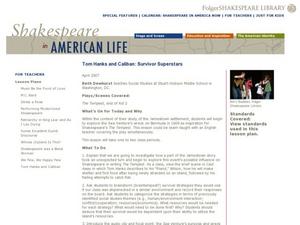Museum of Tolerance
Immigration Journeys
Through the journey of four stories of immigration, scholars complete graphic organizers and apply knowledge to create a visual representation of their findings on a large poster. Third and fourth readers write a letter to their family...
Curated OER
The Antagonist's Point of View
Analyzing literary antagonists is a first step to creating memorable characters in student writing.
The New York Times
Writing Fiction Based on Real Science - NYTimes.com
Refuse to alienate your scientific-minded young scholars during your creative writing unit. Learners explore how literary writing can reflect observable fact, and be based in actual science. The links include examples of fiction and...
Curated OER
Stump the Dump Maze Game
Students complete reading Because of Winn-Dixie individually or as a class. As students reunite Opal and Winn-Dixie in this timed reading comprehension maze game, they demonstrate their understanding of the novel's plot, theme, and...
Curated OER
Brown Bagging with Short Stories
Students participate in a study of short story elements, applying their knowledge and understanding to a selection of short stories. In this short stories lesson, students read five short story selections, identifying conflict, plot,...
Curated OER
Wonderful Westerns
In this book report worksheet, students choose a novel about westerns to read and then completes six various assignments dealing with the novel of their choice.
West Jefferson High School
The Novel — Honor
For classes tackling To Kill a Mockingbird, this lesson plan sets readers up for discussions or essay writing with questions and prompts. The prompts encourage individuals to explore beyond the novel itself, looking at photographs from...
David Elementary
Structural Elements of Drama
The world may indeed be a stage, and players certainly need to know drama vocabulary. This list of 16 terms (and their definitions) often found in scripts will prompt actors to perform their role.
Curated OER
Scene Writing
Eighth graders create an original scene or short one-act play within specified guidelines. Assessment is based upon the performance of student-created scenes during class time. Rubrics for assessment and connection to state standards...
Hawaiʻi State Department of Education
Creating Narrative
Plot, setting, characters, and conflict are common to both drama and narrative stories. Kids create narrated tableaus that show their understanding of the plot, setting, and conflict of a story they've recently read. The lesson plan...
Hawaiʻi State Department of Education
Puppet Scenes
Explore character, plot, and setting through dramatic puppet play. Second graders discuss basic story elements and then practice making a character with their sock puppets. After they've crafted a dynamic puppet, they pair up to create a...
Curated OER
Great Expectations: Group Writing
Examine the differences between totalitarianism and democracy in this writing instructional activity. Using the same format and theme from Great Expectations, young writers work in pairs to compose their own short stories. They follow...
Shmoop
ELA.CCSS.ELA-Literacy.W.9-10.3
Teach your class the basics of narrative writing! The resource first describes the Common Core standard for narrative writing in-depth, and then moves into how to apply the standard. Show your class the example essay and quiz them...
Curated OER
Narrative Writing for Publication
Seventh graders create an original narrative story in a diary or journal format involving a fictional character with conflict, plot, resolution and falling action within the story line. They follow the steps of the writing process with...
Curated OER
The Breaking of Charity
The danger of mob mentality is on display in The Crucible by Arthur Miller. Get your class thinking with some challenging quickwrite questions, then assign characters from the play to be read aloud altogether. Links to worksheets for...
Curated OER
Multimedia Presentation on Roll of Thunder Hear Me Cry
What a wonderful way to follow up on the reading of, Roll of Thunder Hear Me Cry! The lesson has pupils split up into small groups of two to four students. Each group must work collaboratively to create a multimedia project that relates...
Reed Novel Studies
Mr. Stink: Novel Study
Some literary characters are interesting, some are helpful, and some are ... well, stinky. Using the novel study in conjunction with reading Mr. Stink, scholars meet a smelly but kind person named Mr. Stink. Pupils illustrate the plot,...
Curated OER
Stargirl Lesson
Students read a short novel while filling in a graphic organizer for problem and solution. In this sociology lesson, students use a prior knowledge and relate the text to theirselves and to think about their own need to fit in versus...
Curated OER
Personal Poetry: An Introduction to Narrative Poetry
Here are some simple and easy to manage lesson ideas to introduce narrative poetry in your classroom.
Hawaiʻi State Department of Education
Poems That Dance
Combine the elements of dance with the actions in a poem. Learners review basic grammar, write an action-packed cinquain poem, and then choreograph a dance based on their cinquains. After the dances are done, they'll discuss the elements...
Book Units Teacher
Story Elements
This 97-slide PowerPoint uses Charles Dickens's A Christmas Carol, Wilson Rawls, Where the Red Fern Grows, and Jeanne DuPrau's The City of Ember, to illustrate the elements of a story. Setting, plot, characterization (both flat and...
Shakespeare in American Life
Tom Hanks and Caliban: Survivor Superstars
Here’s a clever way to combine language arts and social studies. Shakespeare’s The Tempest is believed to have been inspired by the wreck of the Sea Venture on Bermuda in 1609. The class views a brief scene from Castaway in which Tom...
Lesson Locker
Z for Zachariah: Questions for Study on Chapters 1 - 10
An efficient study guide for the first 10 chapters of Z for Zachariah that covers basic recall questions concerning the characters and the plot. It also includes short writing prompts for selected chapters that extend into the themes,...
Curated OER
The Nature of the Antagonist
Pupils explain the differences between protagonists and antagonists and recognize the fundamental purpose of an antagonist or villain in storytelling. They also explain conflict as used in literature.







